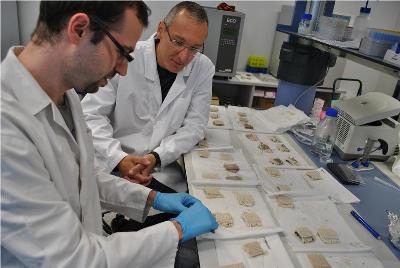A new enzyme-based biological expertise known as ‘cradle-to-cradle’ has been developed by a team of researchers guided by Tzanko Tzanov, a scientist with the Molecular and Industrial Biotechnology Group, at the Terrassa Campus of Universitat Politècnica de Catalunya.
BarcelonaTech, will enable production of carpets that are light in weight, biodegradable, easy to maintain and above all 100% reusable.
 From left to right, researchers Carlos Díaz and Tzanko Tzanov developing the innovative system
From left to right, researchers Carlos Díaz and Tzanko Tzanov developing the innovative system
The traditional wool carpet production methods utilizes latex layer as a binding material to infuse a support, to which the fibers can be bonded. The costly latex material, which needs to be employed through high-temperature vulcanization process reports for nearly 70% weight of a carpet. The latex layered carpet when it is used for a number of years and reaches the life end of its usage is normally destroyed deploying an incineration process producing greenhouse gas emissions. Only 20% of the carpet material can be recycled.
The team of researchers developed a system to ensure the wool free of pesticides and heavy metals selected the wool from New Zealand where the sheep graze organic pastures. The received wool at the production facility is subjected to a pre-treatment process that uses enzymes to clean and remove impurities from the raw wool. The wool is then spun into thread and cross-linked to the carpet base where the backing is infused with a paste produced utilizing oxidative enzymes and phenolic compounds that occur in nature to polymerise the paste. The procedure results in the production of a strong adhesive platform to paste the fibers. The wool fibers that are fixed to the organic platform securely and compactly remain at least twice more durable than the conventionally produced carpets.
The enzymatic process performed in two stages is completed within 30 minutes. In the first stage the carpet is held in 45°C temperature for 15 minutes and then subjected to treatment in 95°C temperature for an additional 15 minutes. The present heating process consumes nearly 50% less energy than a traditional process where 100°C temperature was used for the vulcanization process of latex.
The new enzyme-based organic technology will assist the Netherlands companies such as James, Best Wool Carpet and Bond Textile Research which contributed in the research, in the production of carpets that are 100% recyclable, biodegradable, sustainable and light in weight.
The carpets on reaching the end of their usage can be used as substrate to grow plants or fertilizer. The new system while notably cuts down the carpet production costs also enable cessation of used wools biological cycle.